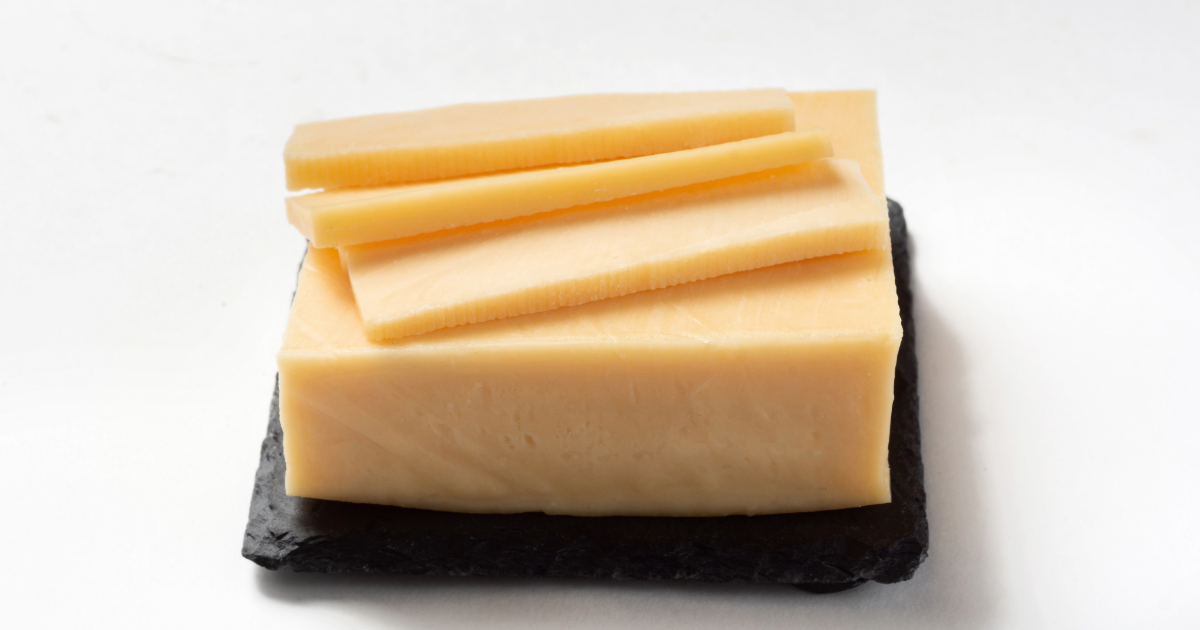Eden cheese is a popular processed cheese product commonly used in Filipino cuisine. With its mild, creamy flavor and texture, it can be added to various dishes like puto, pasta, sandwiches, and more to give a salty, cheesy boost.

However, Eden cheese can be difficult to find outside of the Philippines. Thankfully, there are several tasty alternatives to Eden cheese that provide a similar mouthfeel and flavor profile.
What is Eden Cheese?
Before diving into replacements, it helps to understand what exactly Eden cheese is.
Eden is a brand that produces blocks and slices of processed cheese. While labeled as "cheese," it does not meet the legal definition for cheese in many countries since it combines real cheese with other dairy ingredients like milk and whey.
During production, actual cheese is heated and mixed with emulsifiers, extra milk products, and sometimes flavorings or preservatives. This gives Eden cheese its signature smooth, sliceable texture along with a ** creamy, salty, tangy flavor**. The final product melts easily when cooked.
Eden and other processed cheeses have a decently long shelf life compared to real cheese varieties. The added stabilizers allow the fat and proteins to stay emulsified instead of separating. So you can store unopened Eden cheese at room temperature for months.
Key Takeaway: Eden cheese gets its soft, creamy properties from a blend of actual cheese and other dairy products to make a stabilized, melty processed cheese.
Why Find an Eden Cheese Substitute?
There's clearly demand for alternatives if you're searching for Eden swaps specifically. Here are some of top reasons people need cheese stand-ins:
Eden Cheese Isn't Always Available
While increasingly popular, Eden and similar Filipino processed cheeses can still be hard to locate internationally. Eden cheese is not commonplace in mainstream Western grocery stores. You'll usually have to visit special Asian food marts to track it down.
Dietary Restrictions
Some individuals cannot or prefer not to consume dairyproducts. Eden cheese contains milk, cheese cultures, and whey. People with lactose intolerance, milk allergies, or following vegan or paleo diets require non-dairy substitutes.
Cost
Eden cheese is imported, so it tends to be pricier than basic cheeses in Western countries. Opting for a widely accessible domestic cheese can help save on costs. Cheddar or mozzarella bought at your regular supermarket is typically cheaper per ounce.
Key Qualities to Look for in an Eden Cheese Substitute
To find the best alternatives for Eden cheese, you want to match certain attributes:
Texture/Consistency
A major draw of processed cheeses like Eden is their smooth, sliceable texture that easily incorporates into recipes. Good substitutes should mimic this creamy, spreadable consistency.
Soft cheeses work best to achieve a similar mouthfeel. Hard grating cheeses won't have the right meltability.
Mild Flavor
Part of Eden cheese's appeal is its relatively mild taste. This allows it to combine without overpowering ingredients. Strong, pungent cheeses could be too intensely flavored.
Taste is subjective, but mild flavored cheeses tend to have broader appeal forrecipes requiring an adaptable cheese element.
Melting Ability
Eden cheese effortlessly melts into dips, baked dishes, sauces, etc thanks to its processed dairy base and emulsifying agents. Alternatives should have decent melting properties to fill the same cheesy, gooey role.
Look for softer cheeses advertised specifically as good melters. Hard cheeses usually don't achieve that smooth liquid state when heated.
7 Tasty Eden Cheese Substitutes to Try
Luckily, there's no shortage of options that check the boxes for an ideal Eden cheese stand-in based on the qualities above. Here are top recommendations:
1. Cheddar Cheese
The aptly named "American cheese" gets suggested as an processed cheese alternative, but I actually prefer mild cheddar cheese instead. It better mimics Eden's salty savoriness.
Young, mild cheddar offers a creamy, sliceable texture similar to Eden but with more true cheese flavor. Its pale yellow color also looks more natural versus American cheese's neon orange hue.
For a closer visual and taste, use white cheddar. But regular mild yellow cheddar still provides that salty, nutty profile matching Eden.
Given cheddar's ubiquity, it should be easy to find and cheaper than specialty import cheeses. Just read labels and choose a milder, softer cheddar block for best results swapping in for Eden.
2. Gouda Cheese
Gouda is another excellent substitute, especially if you want that signature Dutch connection to Eden cheese. Since gouda also hails from the Netherlands, it makes a fitting flavor analogue.
Young, mild gouda cheeses have a light sweetness nicely echoing Eden's subtle tang. Like cheddar, gouda offers a range from mild to sharp intensities; stick to the mellower side.
And gouda's smooth, dense paste when not aged lends well to melting seamlessly into any creamy sauce or dip calling for Eden.
For authentic pairings, track down an imported Dutch gouda. But domestic productions can work well too for greater affordability and availability.
3. Monterey Jack Cheese
Don't let appearances deceive you‚ÄĒjust because it's white doesn't mean Monterey Jack cheese lacks that signature melty, gooey goodness of Eden cheese.
Thanks to its high moisture content, Monterey Jack showcases fantastic meltability. It effortlessly transforms into a smooth, liquid state when cooked.
Beyond oozing beautifully into dips or over dishes, Monterey Jack brings a very mild, creamy taste. Its fresh white color even mimics the pale hue of Eden cheese.
For an even closer match, other members of the Jack cheese family like Colby or Cojack (combined Colby and Monterey Jack) offer similar melting capacity and neutral flavors.
4. Mozzarella Cheese
Mozzarella seems an obvious substitution choice given its stringy, melty fame in pizza and pasta dishes. While fantastic melted atop recipes, mozzarella does differ from Eden in some ways.
Fresh mozzarella actually bears the closest resemblance. It has a bright white color and delicately soft, moist consistency similar to Eden, contrasting the firmer texture of aged mozzarella blocks.
In its fresh state, mozzarella offers a subtly sweet, milky flavor that lets other ingredients shine. Its taste stays milder than saltier aged mozzarellas.
The main distinction is that fresh mozzarella still retains a distinctly chewy, stringy quality when melted. So while mozzarella can work beautifully in place of Eden for many applications, expect some differences in actual melted structure.
5. Havarti Cheese
For processed cheese fans, havarti may actually better please your palate. This Danish cheese gets intentionally crafted to offer a creamier, smoother paste more akin to Eden's texture.
In addition to its rich, buttery consistency, Havarti brings a very mild, tangy taste. Its flavor profile stays versatile enough to suit both sweet and savory dishes needing that salty accent.
The trick is choosing a young havarti, as age intensifies its flavor. Havarti's subtle kick also avoids overpowering other ingredients when incorporated into recipes.
Consider havarti an easy-melting Eden cheese upgrade‚ÄĒyou get a similar velvety texture with added complex flavor notes. Just adjust your salt or other seasonings since havarti skews less salty than Eden.
6. Provolone Cheese
Another good melting cheese hailed for its smooth, creamy properties is provolone. While often enjoyed sliced or grated to show off its supple texture, provolone shines just as wonderfully cooked into recipes needing Eden's ooey-gooey abilities.
Traditional provolone affinato (aged) offers more bite and intensified flavor. I suggest the dolce (mild) variations instead with a fainter milky taste better substituting for Edem.
Dolce provolones showcase a more buttery, fruity profile contrasting sharply aged varieties. Their softer paste also contains more moisture for optimal stretching and melting.
Provolone won't mimic Eden exactly but delivers a comparable mellow flavor and meltability once introduced to heat. Adjust accompanying ingredients as needed to balance provolone's increased richness.
7. Queso Blanco
Queso blanco presents an especially fitting swap for those wanting to emulate Eden's traits without dairy.
This fresh Latin American cheese gets made from cow or goat's milk like Eden but actually utilizes a very different process. Queso blanco utilizes acid and heat to form into solid white blocks rather than bacterial cultures aging milk into cheese.
However, the end result yields a product with a mild salty-sweetness and crumbly-smooth consistency closely resembling Eden cheese.
But avoid any pre-shredded queso blanco bags, as anti-caking chemicals can negatively impact melting. Stick with solid blocks and grate yourself for the best melting results.
Queso blanco's neutral flavor and easy melting ability help it adeptly stand-in for Eden in recipes. Just ensure to store properly in brine or liquid, as it dries out quickly.
Key Takeaway: Great substitutes like mild cheddar, young gouda, and fresh mozzarella offer comparable salty-sweet profiles and meltabilities making them suitable alternatives for Eden cheese.
FAQs
Does cream cheese work as an Eden cheese substitute?
Yes, cream cheese can work nicely substituting for Eden cheese in someapplications. Mixing in a little milk helps cream cheese better melt into dips or sauces.
But cream cheese on its own tends to get grainy when cooked directly or slide off sandwiches rather than melting cohesively like Eden. Adjust other recipe elements and use sparingly for best results.
Can I use ricotta cheese instead of Eden cheese?
Ricotta cheese makes for a potential Eden cheese swap thanks to its fresh, bright white appearance and fluffy creamy texture when properly drained. It can lend a similar salty tang and richness to dishes.
However, ricotta lacks the emulsifiers allowing Eden's famously smooth meltability. Ricotta tends to separate and weep liquid when cooked at high heats.
Use ricotta combined with other melting cheeses or add stabilizers like cornstarch when substituting in baked dishes requiring an elastic melt. Stir often to distribute the curds.
What about processed American cheese?
American cheese perhaps seems the obvious choice given its identification as a processed cheese product like Eden. However I don't find it provides the best flavor or melt match.
The heavily processed nature of American cheese gives it a plastic-like texture. And its tang skews more sour rather than subtly sweet like Eden.
But for strict Preheat applications like grilled cheese sandwiches, American cheese can work reasonably well mimicking Eden's gooey melt thanks to similar emulsifying agents.
So while melty, I suggest other alternatives that better capture Eden's actual taste and mouthfeel unless following a traditional American recipe. But in a pinch, American cheese can substitute decently.
Conclusion
While extremely tough to duplicate precisely, the beauty of Eden cheese is you don't necessarily need a perfect replica ingredient to enjoy your favorite dishes requiring it.
Numerous options exist offering comparable textures and salty-sweet profiles to closely stand-in for Eden. Mild cheddar, young gouda, Monterey Jack, fresh mozzarella, and other soft, creamy melty cheeses act as suitable substitutes in recipes to still achieve delicious results.

